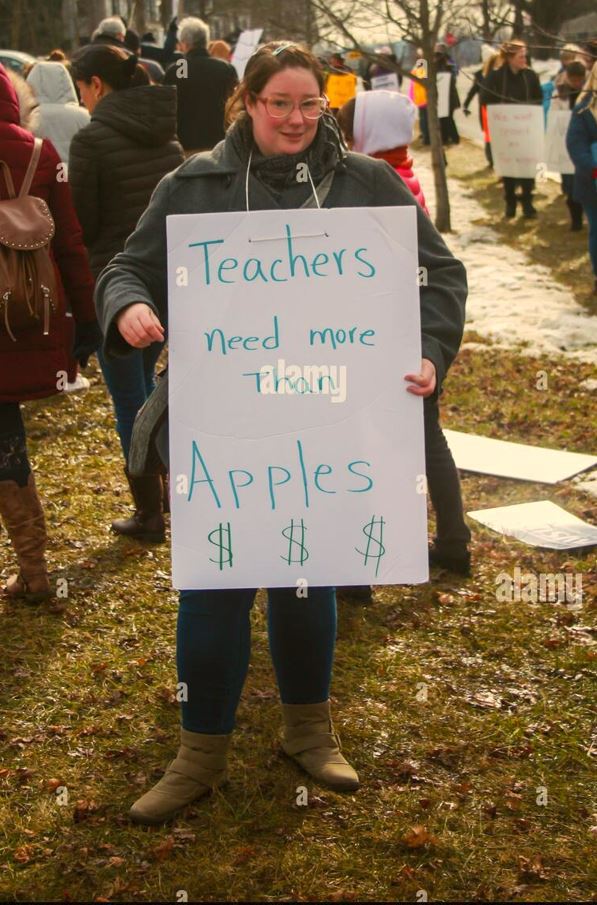Teacher Pay Trails Gains in Earnings Experienced by Overall Workforce
Source: PolitiFact; Economic Policy Institute, Sylvia Allegretto; LawInfo.com; US Department of Labor; Salary.com
As students and teachers were heading back to the classroom, Education Secretary Miguel Cardona appeared on NBC’s “Meet the Press” and CBS’ “Face the Nation” to discuss the state of education in the U.S. On “Meet the Press,” Cardona expressed regret that teacher pay across the country has not increased significantly over the past quarter century.
“Well, if you’ve heard my interviews, you’ve heard me say this teacher shortage issue is a symptom of what I call a teacher respect issue,” Cardona told host Chuck Todd on August 21st. “We need to respect the profession better.”
College graduates earn 33% more than your average teacher when they leave. In addition, adjusted for inflation, over the last 25 years teachers have made a $29 increase in their salary over the course of a week. The gains over 52 weeks amount to $1,508 (although many teachers are not paid over the summer).
“Still, that’s not a lot of a gain over 25 years, and it trails the gains seen by workers overall by a modest amount and trails the gains seen by college-educated workers by even more.. That is unacceptable, the fact that we’ve normalized teachers driving Uber on the weekends to make ends meet or working at a restaurant, waiting tables to make ends meet. We have to lift the profession.” noted Cardona.
The Economic Policy Institute, released a report on August 16th where the group found that teachers’ inflation-adjusted average weekly wages had increased by just $29 from 1996 to 2021, specifically from $1,319 to $1,348 in inflation-adjusted dollars.
National Center for Education Statistics data to find the estimated average annual salary of teachers in public elementary and secondary schools found from the 1995-96 school year to the 2020-21 school year, average annual K-12 teacher salaries in public schools rose from $64,113 to $65,090. That’s an increase of $977 after accounting for inflation.
That wage-scale gain trailed those experienced by full-time workers as a whole. The increases for workers with a bachelor’s degree or higher — a category most teachers would fall into — increased even more rapidly.
Education Department statistics show that workers with a bachelor’s degree or higher had median annual earnings of $50,480 in 1995 and $54,102 in 2020 (using 1995 dollars to adjust for inflation). That’s an increase of more than $3,622 over the same period, or a rate of increase much higher than for teachers.
Over a 25-year period, even the more generous estimate for teachers’ wage gains — $1,508 — works out to just a $60 pay increase above inflation every year, on average.
Over the last 18 years the Economic Policy Institute (EPI) has closely tracked trends in teacher pay. “Over these nearly two decades, a picture of increasingly alarming trends has emerged. Simply put, teachers are paid less (in weekly wages and total compensation) than their nonteacher college-educated counterparts, and the situation has worsened considerably over time.
Prior to the pandemic, the long-trending erosion in the relative wages and total compensation of teachers was already a serious concern. The financial penalty that teachers face discourages college students from entering the teaching profession and makes it difficult for school districts to keep current teachers in the classroom. Trends in teacher pay coupled with pandemic challenges may exacerbate annual shortages of regular and substitute teachers.”
There is a teacher crisis in the United States, which EPI believes can be reversed: “Providing teachers with compensation commensurate with that of other similarly educated professionals is not simply a matter of fairness but is necessary to improve educational outcomes and foster future economic stability of workers, their families, and communities across the U.S.”
So How Does This Information Tie Into Labor Day?
Observed the first Monday in September, Labor Day is an annual celebration of the social and economic achievements of American workers. The holiday is rooted in the late nineteenth century, when labor activists pushed for a federal holiday to recognize the many contributions workers have made to America’s strength, prosperity, and well-being.
A teachers’ union is a special type of labor union designed to fight for the rights of educators. With roots dating back more than 150 years in the U.S., these organizations play critical roles not only in securing benefits for teachers but also shaping the way education works. For instance, thanks to lobbying by the National Education Association, or NEA, in the late 1860s, Congress created the Department of Education.
Under state and local labor laws, teachers’ rights are represented through collective bargaining units known as teachers’ unions. Teachers’ unions generally represent the needs of a collective group of educators on matters including wages or compensation, hours of work, job functions, and other aspects.
The teachers’ unions’ purpose is to help them; they aim to achieve proper functioning of the education system. These unions are made up of people interested in and passionate about education.
Public School Teacher Salary in Stratford, Connecticut
How much does a Public School Teacher make in Stratford? The average Public School Teacher salary in Stratford, CT is $62,643 as of July 26, 2022, but the range typically falls between $52,319 and $76,377. Salary ranges can vary widely depending on many important factors, including education, certifications, additional skills, the number of years you have spent in your profession.




Thanks for this informative article. I know that those in or retired from teaching careers are aware of the differences between how teachers are compensated compared to other professional careers. To attract and hold dedicated, qualified people in our schools, respect, safe environments in the schools and fair compensation for what they give is essential and absolutely necessary. We all need to support teachers in their efforts to improve condirions in their profession.
Excellent article and information. Thank you. As an educator in higher education for over 30 years, I can confidently correlate the devaluing of education in the United States with the declining state of our union.
Very much agree, Karen. The future of our Democracy depends on an educated public. Dedicated, ample upport for public education is crucial.